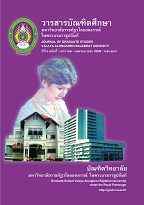รูปแบบการพัฒนาภาวะผู้นำของผู้อำนวยการโรงเรียนที่บริหารโดยใช้โรงเรียนเป็นฐาน MODEL FOR LEADERSHIP DEVELOPMENT OF SCHOOL ADMINISTRATORS IN SCHOOL BASED MANAGEMENT
Main Article Content
บทคัดย่อ
บทคัดย่อ
การวิจัยนี้มีวัตถุประสงค์เพื่อสร้าง ตรวจสอบ และนำเสนอรูปแบบการพัฒนาภาวะผู้นำของผู้อำนวยการโรงเรียนที่บริหารโดยใช้โรงเรียนเป็นฐาน ดังผลการวิจัยมีดังต่อไปนี้
1. ผลการศึกษาวิเคราะห์ สังเคราะห์คุณลักษณะภาวะผู้นำของผู้อำนวยการโรงเรียนที่บริหารโดยใช้โรงเรียนเป็นฐาน จากเอกสารทางวิชาการ แล้วตรวจสอบความสำคัญของคุณลักษณะภาวะผู้นำด้วยเทคนิคเดลฟายกับผู้เชี่ยวชาญจำนวน 17 ท่าน โดยใช้แบบสอบถามกึ่งสัมภาษณ์และแบบสอบถามปลายปิดจำนวน 2 รอบ พบคุณลักษณะจำนวน 6 ด้าน ได้แก่ ด้านความรู้ ด้านทักษะ ด้านทัศนคติ ด้านคุณธรรมจริยธรรม ด้านบุคลิกภาพและด้านการบริหาร รวม 115 ข้อ
2. ผลการศึกษา วิเคราะห์ สังเคราะห์ วิธีการพัฒนาคุณลักษณะภาวะผู้นำจากเอกสารและหลักฐานทางวิชาการ แล้วตรวจสอบความเหมาะสมของวิธีการพัฒนาจากการสอบถามความคิดเห็นของผู้เชี่ยวชาญจำนวน 17 ท่าน พบวิธีการพัฒนาจำนวน 28 วิธี
3. ผลการศึกษา วิเคราะห์ รูปแบบการพัฒนาภาวะผู้นำจากเอกสารงานวิชาการ แล้วนำคุณลักษณะและวิธีการพัฒนามาสังเคราะห์เป็นรูปแบบการพัฒนาภาวะผู้นำของผู้อำนวยการโรงเรียนที่บริหารโดยใช้โรงเรียนเป็นฐาน
ABSTRACT
The purpose of this research was to develop, test and propose a model for the leadership development of administrators involved in the school-based management of schools. The findings from each stage of the research are as follows.
Leadership traits in the context of administrators involved in school-based management of schools were analyzed and synthesized from academic sources. Identified component of leadership traits were than evaluated by 17 expert using semi-structured interviews and two rounds of the Delphi technique. The result of this stage were categorized into six areas comprising 115 aspects of leadership traits. The six areas of leadership traits consisted of Knowledge, skills, attitudes, ethics, personalities and management.
Leadership Development methods were analyzed and synthesized from academic sources. The identified methods were than evaluated by 17 experts using close-ended questionnaires. The result of this stage found 28 leadership development methods.
Components of a leadership development model were analyzed and synthesized from academic sources. Leadership traits, development methods and model components were synthesized into a leadership development model in the context of school-based management of schools.
Article Details

อนุญาตภายใต้เงื่อนไข Creative Commons Attribution-NonCommercial-NoDerivatives 4.0 International License.
บทความทุกเรื่องได้รับการตรวจความถูกต้องทางวิชาการโดยผู้ทรงคุณวุฒิ ทรรศนะและข้อคิดเห็นในบทความ Journal of Global of Perspectives in Humanities and Social Sciences (J-GPHSS) มิใช่เป็นทรรศนะและความคิดของผู้จัดทำจึงมิใช่ความรับผิดชอบของบัณฑิตวิทยาลัย มหาวิทยาลัยราชภัฏวไลยอลงกรณ์ ในพระบรมราชูปถัมภ์ กองบรรณาธิการไม่สงวนสิทธิ์การคัดลอก แต่ให้อ้างอิงแหล่งที่มา


